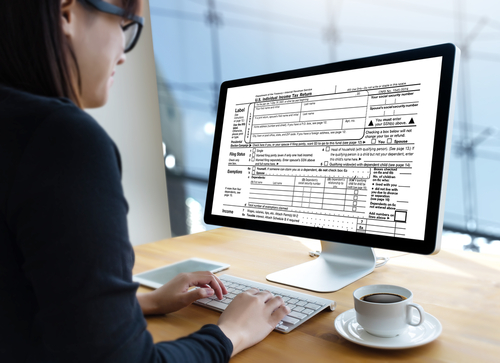
Table of Contents
- What is artificial intelligence?
- Types of AI
- A comprehensive example of how to use AI in accounting
- Understanding the limitations of AI in accounting
- Fears of obsolescence
- Accounting AI software
Summary
While some see AI in accounting as a threat, it can actually be a valuable tool to help support and streamline your work. Through machine learning, natural language processing, and automation, artificial intelligence can take on the tedious tasks of data entry and report generation as well as support strategic decision-making, though it's important to understand the need for human understanding and insights.
Artificial intelligence (AI) is more than just a buzz-worthy topic, many of us use AI in some form every day, especially for personal use. Maybe you're using Chat-GPT to create a travel itinerary or asking Siri for the name of a book you can't remember. But you can also use AI in accounting to reduce your workload and complete projects more efficiently and thoroughly.
And I'll admit, while I first viewed using AI in accounting with skepticism, now I look at it with optimism for myself as a former practitioner turned professor and for my students entering the profession. It's on track to become a tireless assistant who can save us from late nights we've all seen too often.
But how?
What is artificial intelligence?
AI is the capability of a machine to imitate intelligent human behavior, specifically the ability to learn, understand, and apply knowledge and skills that would typically require human intellect.
There are four classifications of AI capabilities:
- Reactive: Extremely limited and can only react to established rules and does not have the ability to learn (Examples: motion sensors or a programmable thermostat)
- Limited memory: Can access and use memory to learn but is limited by how much data it can retain and use to make decisions (Example: image recognition)
- Theory of mind: AI that considers, understands, and predicts the human interaction and behaviors (Example: self-driving cars, virtual therapists)
- Self-aware: AI that is conscious and aware of its own existence. (No examples; this is purely hypothetical)
While artificial intelligence capabilities are incredibly advanced, your input is key to its success. Without critical thinking and professional judgment to create prompts, set up tests, and run automation, using AI in accounting will cause more problems than it solves. Whether you're a leader, practitioner, or educator, you must understand AI's capabilities and when and how to implement them.
Types of AI in accounting and how to use it
With this in mind, let's look at different types of artificial intelligence and examples of how to use AI in accounting.
Machine learning
Machine learning is a branch of AI that allows computers to gain knowledge, predict outcomes, and make decisions autonomously by creating algorithms and models capable of learning patterns and relationships from data. Accountants can use machine learning to:
- Running risk analysis to understand relationships between variables better
- Review potential fraudulent scenarios and detecting anomalies based on hypothetical and real situations
- Forecast financial performance
- Determine optimal tax savings for a client through a review of deductions, credits, and tax laws
Natural language processing
Natural language processing (NLP) is the ability of a computer to understand, interpret, and utilize written and spoken human language, such as predictive text. Natural language generation (NLG) is a branch of NLP that focuses on producing language that simulates human speech and writing and can engage with the user, such as through a chatbot or content creation.
Accountants can use NLP for:
- Document classification and information extraction: Find relevant language in lengthy documents for regulatory and compliance procedures, saving time on manual review
- Text summarization: Summarize financial documents, reports, or transcripts to identify key information
- Transcribing information: Verbally record inventory counts
- Receivable confirmation: Create, send, and follow up on receivable confirmations during audits
Accountants can use NLG to:
- Financial Statement Generation: Generate drafts of financial statements and required disclosures
- Client communication: Draft personalized communications to clients about tax or financial matters
- Audit documentation: Generate standardized audit documentation based on test results
- Summarize information: Use your manually created notes and findings to build summaries
Becker used machine learning, natural language processing, and natural language generation to aid in creating Newt™, our AI assistant and study tool. Built using Becker's curriculum, exam review students can ask questions and get reliable information immediately!
Computer vision
Computer vision allows computers to "see" and comprehend visual data, enabling them to analyze images and videos. Machine vision is a branch of computer vision used to interpret and understand images focusing on industrial automation and inspection.
Accountants may use computer vision (including optical character recognition or OCR) in the following ways:
- Extract information from supporting documentation
- Digitize documents to make them machine-readable and editable
- Detect and classify inventory in images or video for accurate counting and documentation Implement biometrics as internal controls
Accountants can also use machine vision in managerial accounting for quality assurance and process management.
Automation
Automation (including Robotic Process Automation) employs software bots to automatically manage repetitive, rule-based, and mundane tasks typically performed by humans. Intelligent automation enables automation to utilize other AI capabilities, such as machine learning, NLP, and computer vision.
Accountants can use intelligent automation for:
- Completing data entry
- Creating sample selections for testing
- Creating amortization schedules
- Performing audit confirmations
- Generating reports and e-mails
- Performing routine audit tests and reconciliations
For example, intelligent automation using OCR could match purchase orders, receiving documents and invoices (three-way match) before invoice payment, regardless of the origination channels or format.
A practical example of how to use AI in accounting
Let's look at how AI in accounting can streamline a common financial accounting scenario. Watch the video below for the steps and read on for more detail!
You have a 42-page hard copy of a lease agreement for a warehouse your company is renting and have been asked to classify it and create an amortization schedule. You could pour yourself that fifth cup of coffee and begin reading or embrace AI to save time and improve accuracy with these steps:
- Use OCR to digitize the lease agreement.
- Allow NLP and machine learning techniques to interpret, understand, and categorize the document's details and identify payment schedules, lease durations, and other critical financial clauses.
- Generative AI can reference FASB standards to summarize the agreement and note how the lease should be classified.
- Generative AI can then use the extracted data to create a detailed amortization schedule automatically and map out the payment timeline and amounts based on the agreement's terms.
Now, you can review the output rather than create it.
Understanding the current challenges of AI in accounting
When AI can pass the CPA Exam, it seems almost limitless in its capabilities. But even though AI is changing the way accountants can and will do their jobs, but there are still many limitations. Let's explore the challenges of AI in accounting and how to overcome them.
A lack of critical thinking
AI, whether for accounting or any other use, can't "think outside the box." It lacks the self awareness and emotional intelligence needed for complex, judgment-based decisions. So, while it can augment human creativity and analytical capacity, it’s not able to be creative or analytical on its own and is highly dependent on the quality and breadth of its training data. Instead of AI driving any innovation, humans must understand and evaluate the new challenges and concepts first.
Not all accounting AI is created equal
Not all AI is created equally, nor are the companies that employ it. When you think about artificial intelligence processes, you probably think of advanced systems and software programs that integrate effortlessly with huge quantities of high-quality data, creating crisp reports through intuitive, well-designed dashboards.
But the reality is that the integration of AI in accounting processes often reflects the scale of the firm. Large organizations can adopt advanced, high-cost AI technologies more readily than mid-sized or small firms. This disparity could widen the technological divide, with smaller firms using inferior AI solutions that become outdated, rely on low-quality data, or don’t fully integrate with existing hardware.
Reliance on inaccurate data
Accountants have always had to deal with poor data quality; however, poor AI may make a challenging situation worse. The effectiveness of accounting AI largely depends on the quality of the training data. Poor-quality data can lead to significant inaccuracies and errors, which are particularly problematic in accounting. If the data is outdated, irrelevant or unreliable, this can undermine the integrity of the outcome.
Generative AI models that have these data issues become less effective at solving more complex or judgment-based problems. For example, some AI models have had “hallucinations” where information is created without a source. Accountants must be proficient in data wrangling to mitigate these risks and ensure data relevancy, accuracy, and integrity.
Lack of human touch
AI can simulate human interactions but cannot replace the human touch required in sensitive situations, such as negotiating with clients or managing employee relations.
Using AI in accounting also raises significant concerns regarding consumer privacy, transparency, and the traceability of decision-making processes, necessitating a thorough understanding and scrutiny of AI tools by accountants. As technology utilized in AI grows and changes, employees and management must be flexible and adaptable to overcome challenges in the inevitable learning curve.
AI in accounting brings fears of obsolescence
An additional challenge about AI in accounting comes from potential resistance from accountants, especially if they perceive that AI developments may threaten job security. Fortunately, fears of obsolescence are largely unfounded. Like past technological advances, AI is unlikely to displace the accounting profession. Instead, the shift offers improved efficiency, more time to devote to critical and strategic decision making and enhanced opportunities to provide value-added services in AI implementation, evaluation, and compliance with evolving regulations.
Considering accounting AI as a colleague
In embracing AI, accountants are not handing their roles over to machines but are instead stepping into the future of accounting. One where their expertise is augmented by technology, not replaced. The future belongs to those who embrace AI, not as a replacement, but as an indispensable ally.
Accounting AI software
Now that we’ve discussed what it is, the types of AI in accounting you’re likely to encounter, and some of the challenges and value it offers, let’s look at the most common software options to support AI in accounting.
Excel is a comfortable place for most accountants because it is both familiar and powerful, but you may be seeing changes in its functionality through AI capabilities. While it isn’t going anywhere anytime soon, the exponential growth in AI capabilities from new startups in software has driven existing programs, including Excel, to add AI components to remain competitive.
As it pertains to the accounting profession, users benefit from AI software that can do the following:
- Automate processes
- Prescribe decisions
- Predict outcomes
- Detect anomalies
- Document activities
- Transcribe calls
- Digitize, extract, and understand documents
- Populate templates
- Understand and apply accounting-based rules and concepts, among other possibilities.
Based on the variety of needs, it is likely that most firms will or already do employ various software including proprietary tools. To remain relevant and efficient, accountants must familiarize themselves with a variety of AI tools that automate processes and enhance decision-making capabilities.
Key AI software includes (but is definitely not limited to):
- Tableau AI Analytics: Creates data visualizations and dashboards, can analyze data and identify patterns, and enables anomaly detection and cluster analysis to support fraud detection
- Microsoft Copilot: Integrates with Microsoft suite products to generate data insights through natural language queries.
- Alteryx AiDIN: Enhances the Alteryx analytics platform with AI capabilities to automate and optimize data workflows.
- ChatGPT by OpenAI: Offers extensive text analysis, summarization, and calculation capabilities, making it an effective tool for interactive and interpretative tasks.
- IBM Watson: Provides robust data analysis and natural language processing solutions to support complex decision making.
- UI Path with AI: Combines RPA with AI to improve process efficiencies and discover new operational opportunities.
The integration of AI in audit and accounting not only challenges accountants to adapt and innovate but also equips them with the tools to perform at higher levels of efficiency and strategic insight. By embracing AI, accountants can transcend traditional roles and drive the profession toward a tech-savant future. The journey will require perseverance, adaptability, and a commitment to continuous learning and ethical standards.
Take the next step: CPE to support learning about AI in accounting
If you would like to learn more about AI in accounting and implement it into your work, Becker offers a wide variety of CPE courses to support taking these next steps. Check out these options:
- Artificial Intelligence for Accountants
- Using AI in an Audit
- Navigating AI Ethics: Balancing Innovation and Responsibility








